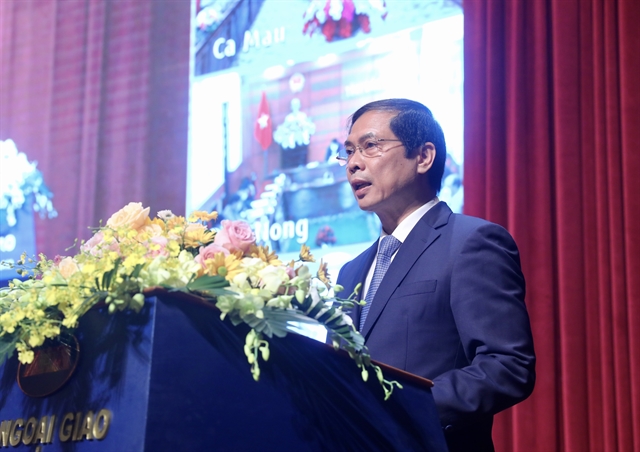 Politics & Law
Politics & Law


|
| Foreign minister Bùi Thanh Sơn speaks at the meeting. — VNA/VNS Photo |
HÀ NỘI — Việt Nam has just relinquished the chair of ASEAN and is currently a non-permanent member of the UN Security Council. The Ministry of Foreign Affairs hopes to build on these successes through The 20th National Conference on Local Diplomacy, which aims to continue improving international relations and foreign affairs.
Speaking at the event, which is being held both online and in-person, Minister of Foreign Affairs Bùi Thanh Sơn said that since the 19th conference in 2018, the regional and global situation has undergone many complex and profound changes.
Under the leadership of the Party, the Government and the engagement of the whole political system, localities have made great efforts to overcome the difficulties and challenges of the COVID-19 pandemic while maintaining socio-economic development and promoting international integration.
Việt Nam has received effective international support in terms of vaccines, medical equipment and treatment drugs to enable the whole country to safely adapt to the pandemic while fostering socio-economic recovery and development. The country’s relations with many partners, especially neighbouring countries, who are both important partners and traditional friends, have been further expanded and deepened, he said.
Việt Nam has successfully implemented its role as the ASEAN Chair in 2020 and as a non-permanent member of the UN Security Council during the 2020-21 tenure, making active and responsible contributions at many international forums, such as signing and implementing free trade agreements (FTAs), including new-generation FTAs such as the Comprehensive and Progressive Agreement for Trans-Pacific Partnership (CPTPP), the EU-Việt Nam Free Trade Agreement (EVFTA) and the Regional Comprehensive Economic Partnership (RCEP), according to Sơn.
The minister elaborated further, saying that cultural diplomacy, information for foreign services, overseas Vietnamese-related affairs and citizen protection have been carried out effectively. Localities have done well in performing border and territory-related work, helping to build borderlines of peace, friendship, cooperation and development.
Sơn asked participants to clarify the position, role and missions of local diplomacy in the new development stage, and mobilise external resources to serve socio-economic development, as well as raise the position and prestige of localities during the international integration process.
It will also be necessary to consider the socio-economic development of localities a key task of local diplomacy work, taking advantage of favourable conditions caused by expanded foreign relations and international commitments. This will contribute to expanding development space for localities to attract investment in technology, tourism and other resources for continued growth.
“The 2021-2030 socio-economic development strategy puts forward a policy to build economic diplomacy to serve development with a people and businesses-centred approach. To contribute to bringing this policy of the Party to life, it is essential to have close coordination between agencies of foreign affairs,” he said.
He confirmed that the diplomatic sector will continue to grasp the situation of localities, in order to help them implement their development strategies and plans effectively.
Implementing local diplomacy also requires a grasp of international and domestic situations to creatively and proactively apply socio-economic development and diplomacy policies of the Party. The unique conditions of each locality, based on specific plans, are particularly important for local development, he said.
Apart from traditional fields, localities should open new areas and search for new partners and more effective development paths to bring in more practical results, the minister added.
Minister Sơn stressed that local diplomacy can only succeed with the support and consensus of local authorities, departments, agencies and sectors as well as guidelines, coordination and support from central-level agencies.
Another important factor is to improve the capacity of staff working in the field of foreign affairs at localities, he said.
Vice-Chairman and General Secretary of the Việt Nam Union of Friendship Organisations Phan Anh Sơn said in 2021, amid the COVID-19 pandemic, the union and its members have proactively changed diplomacy activities to an online form while taking measures to improve the quality and efficiency of tasks relating to consulting, researching and disseminating information about external relations.
They have continuously expanded the networks of friends and partners and actively taken part in multilateral cooperation mechanisms in the region and the world, he said.
Chief of the Office of the Party Central Committee's Commission for External Relations Bùi Lê Thái said the diplomacy work of localities has strong, but shortcomings remained. Slow information dissemination and implementation of Party and State regulations on diplomacy, and the implementation of external relation activities have been scattered and lacked focus; Party diplomacy work was paid little attention and mostly implemented at border localities. People-to-people diplomacy activities lacked innovation.
He proposed localities promptly implement Party diplomacy guidelines, build action plans and programmes and enhance cooperation with partners to ensure rapid and sustainable development for each locality, contributing to national protection. — VNS




